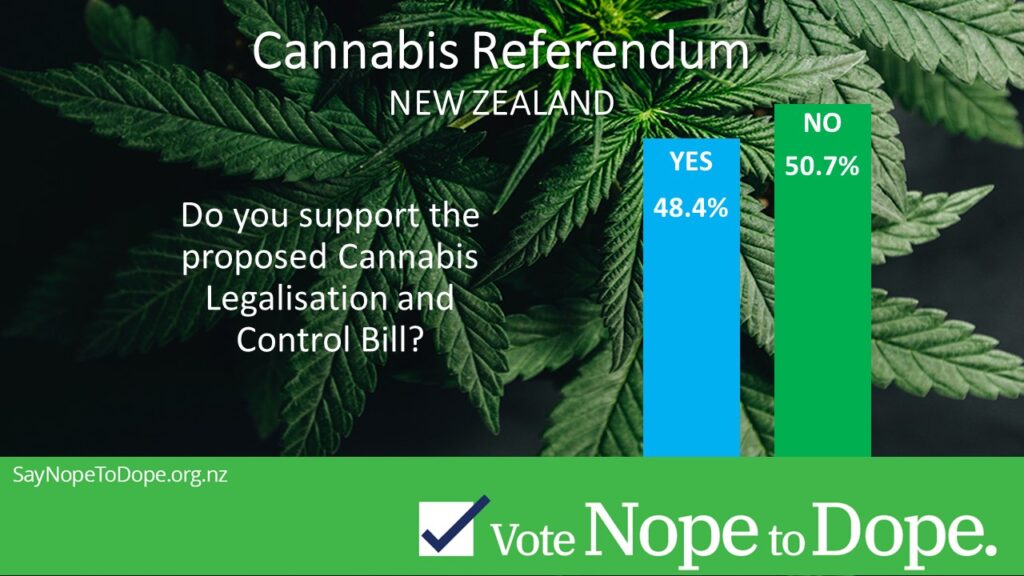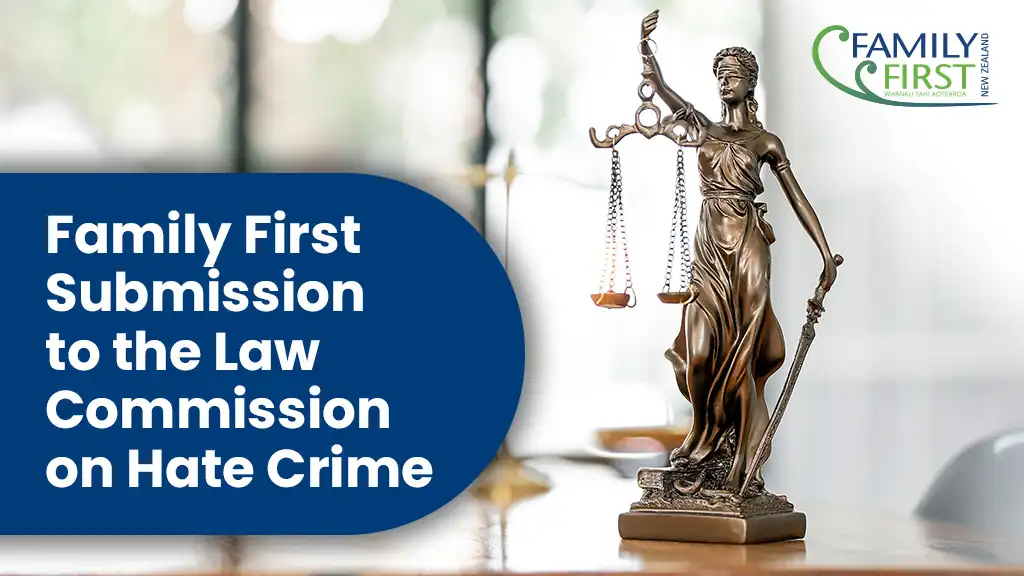While the NZ media continue their campaign for drugs and to legalise marijuana – yes, they’re still trying, I’ll show you some recent examples shortly – we continue to see highly alarming outcomes from legalising cannabis in US states, including “spiralling addiction, psychotic illnesses and hospitals facing a deluge of poisonings”.
Remember the claims made by pro-drug activists in support of cannabis legalisation in New Zealand. According to the Government, the Green Party, NZ Drug Foundation and Helen Clark Foundation, we were supposed believe that legalising recreational cannabis would lead to significant health benefits, reduced black market, no increase in usage, reduction in mental health issues, reduced crime and so on. Thankfully, 51.2% of us weren’t fooled into believing this, just enough Kiwis to vote down the proposed cannabis legalisation bill.
And there is continued mounting evidence refuting those pro-cannabis claims.
Scientists overwhelmingly conclude that frequent use of the drug is not worth the risks.
Here’s three major studies that have just been released:
From Smart Approaches to Marijuana (also known as SAM), they report with regard to the first states that legalised marijuana in the US – Colorado, Washington, Alaska and Oregon:
The National Survey on Drug Use and Health (NSDUH) is the nation’s premier survey that assesses the prevalence of substance use and substance use disorder.
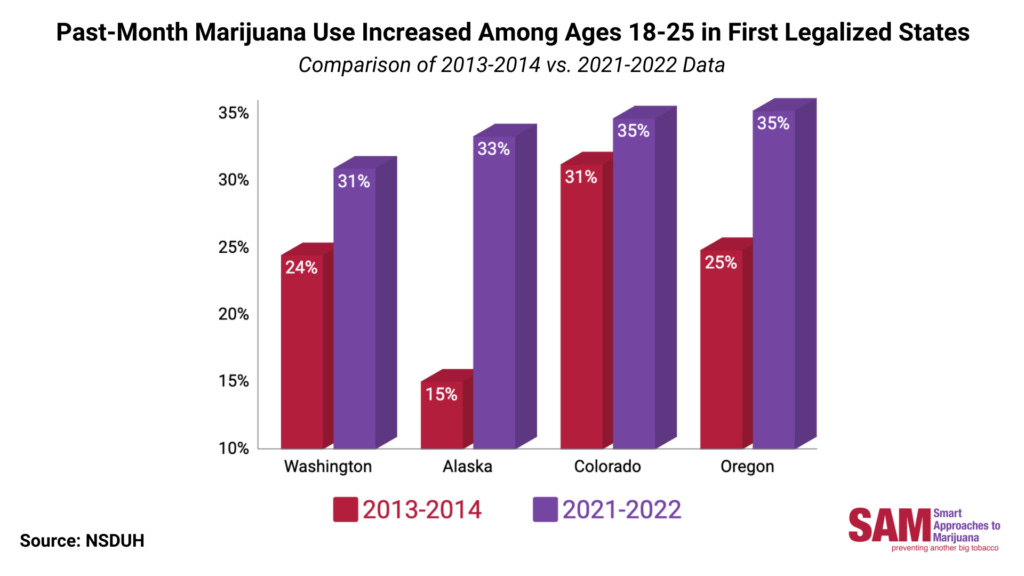
The prevalence of past-month marijuana use among 18–25-year-olds has increased in the first four states that legalized recreational marijuana: Colorado and Washington legalized during the 2012 election cycle and Alaska and Oregon legalized in the 2014 cycle. Past-month use––as opposed to lifetime or past-year use––is indicative of heavier, more frequent use. Marijuana is also not legal for use until age 21, meaning many of these individuals are underage users.
So there are frequent users – not just a one-off or a very occasional dabble.
While 30–35% of 18–25-year-olds in the first states that legalized recreational marijuana were past-month users of marijuana in 2021–2022, this was closer to 18–22% in the states that have not legalized marijuana.
So keeping the drug illegal keeps the use down in this age group. Probably don’t need to be a rocket scientist to figure this out eh.
This trend is especially concerning for the 18–25-year-old demographic, given that their brains are developing. The CDC warns, “The teen brain is actively developing and continues to develop until around age 25. Cannabis use during adolescence and young adulthood may harm the developing brain.”
So that’s not good.
Remember NZ was going to make the age limit at 20 thinking they could somehow prevent younger people increasing their usage. In the US it’s 21 – yet they’re still having difficulties. It would have been worse for New Zealand.
The second study was reported in The Centrist last week. It said:
A new study, published in JAMA Pediatrics, analysed data from 355 women at Ohio State University Wexner Medical Center, showing that children exposed to cannabis during pregnancy had “poorer task-based planning ability” and exhibited “more observed aggression” by age five.
These developmental impacts may hinder children’s long-term academic success.
Cannabis use in pregnancy, often turned to for relief from stress, nausea, or sleep issues, may have lasting implications. Lead researcher Sarah Keim advised against it, despite cannabis being “a natural product,” due to its “many risks.” Keim noted, “Our findings…confirm and expand on longstanding evidence.”
Alongside cannabis, many participants were exposed to other substances, such as tobacco and alcohol, with many living below the poverty line. This added complexity to understanding cannabis’s specific impact on child development.
Another aspect of the study highlights additional physical risks. Pregnant women who use cannabis face a higher risk of conditions like pregnancy-induced hypertension, with one study noting a 19% chance of placenta detachment.
Research also links cannabis exposure to brain development issues in the prefrontal cortex, essential for learning. “It is recommended that pregnant persons do not use cannabis,” the CDC warned, reinforcing that tetrahydrocannabinol (THC) can pass through the mother to the baby, impacting their health across multiple areas.
Once again, don’t need to be a rocket scientist to understand this.
But because the baby is a separate human life dependent on the mother and subject to her lifestyle, these decisions of the mother don’t just affect the mother!
One more.
Two weeks ago, and once again thanks to our friends at SAM for reporting this:
[A] massive new study was published in one of the most prestigious journals in the pediatric world, the Journal of the American Academy of Child and Adolescent Psychiatry. The study found that state legalization of recreational marijuana increases the likelihood of marijuana use in the past month among youth and young adults. Past-month use is a much clearer indicator of frequent use than “lifetime use” or “past-year use.”
The systematic review titled “Systematic Review and Meta-Analysis: Medical and Recreational Cannabis Legalization and Cannabis Use Among Youth in the United States” found that recreational marijuana legalization increases the odds of past-month marijuana use by 13% among youth and 22% among young adults.
This is not just one study saying that use goes up after legalization, this is a systematic review of the published data on this topic. Because systematic reviews take an exhaustive look at available research and use a transparent, repeatable approach to review studies, they minimize bias and are highly regarded among researchers.
This study directly contradicts the marijuana industry talking point that legalization does not increase youth use.
Sorry – just one more. It’s relevant. You’ll see why.
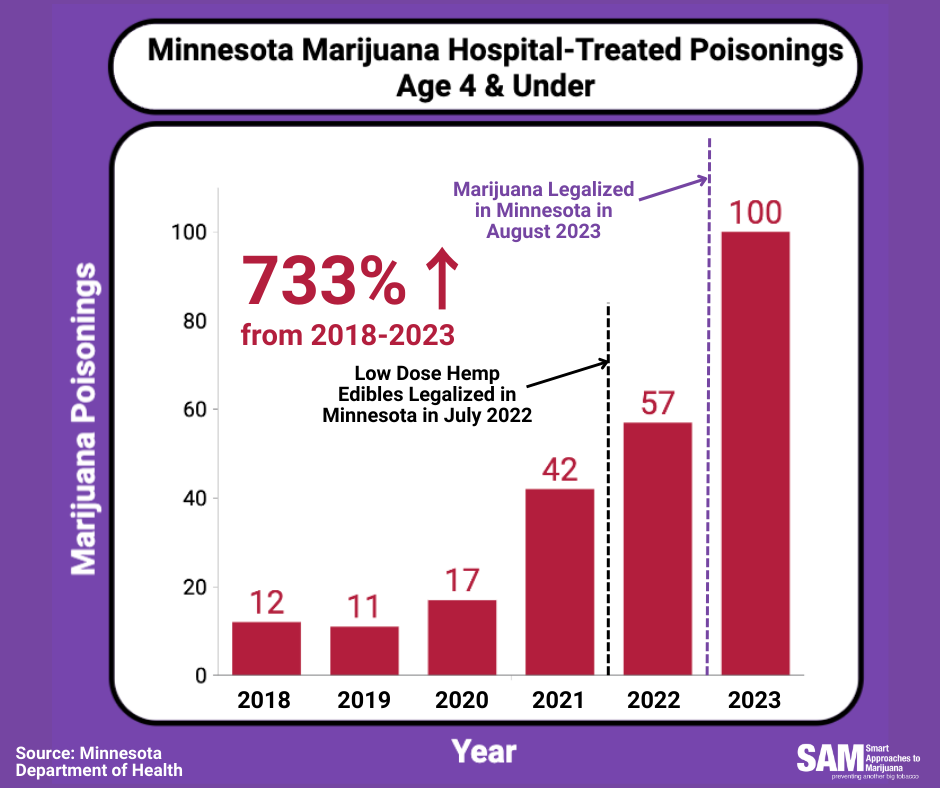
According to the Minnesota Department of Health, from 2018 to 2023, the number of marijuana hospital-treated poisonings for children aged 4 and under increased by 733%:
Cannabis is now legal for adults 21 and older to use and possess in Minnesota. The bill was signed into law on May 30, 2023, by none other than Governor Tim Walz – yep, Kamala Harris’ running mate.
Now, what’s happening in NZ.
Well, the media continue to campaign for legalisation despite not being able to win the referendum in 2020. They’re still sulking. Derek Cheng at the NZ Herald is regularly writing about the issue. In fact, in our analysis of the media coverage of the cannabis referendum, he was one of the worst culprits in his coverage with a 70 / 30 bias in favour of a yes vote from his 9 articles.
And he was back this week
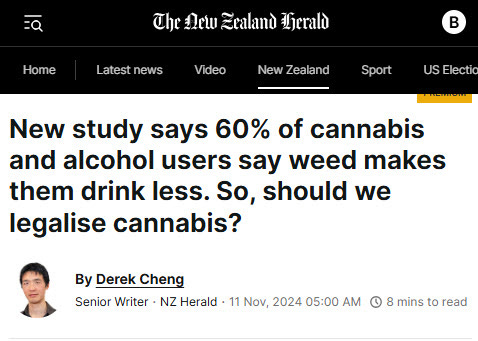
Would legalising cannabis lead to an overall reduction in substance-related harm?
This is the “tantalising” prospect teased in a new study into whether cannabis is a substitute or complement for alcohol: 60% of those using both said their cannabis use resulted in drinking less on a “typical occasion”, and also drinking less frequently.
The demographic groups more likely to be among this group include Māori (19% more likely than non-Māori), men (14% more likely), and adults older than 21 (28% more likely for the 21-25 age group, compared to the control group of those aged 35+).
A significant proportion also substituted cannabis for methamphetamine: 40% of co-users said using cannabis led to less meth consumption.
“If cannabis was legal, it wouldn’t stop people drinking. But if they reduced the quantity of alcohol they drank, that would be quite a considerable public health gain,” said Massey University Associate Professor Chris Wilkins, co-author of the paper Exploring the substitution of cannabis for alcohol and other drugs.
It shows the harms of drugs – and note which one is causing the most harm. The legal one – alcohol.
If you go on the argument that legalising cannabis will lessen the harm (in the orange circle) then why don’t we legalise cocaine and ecstasy (as shown in the yellow circles) because the harm is less.
The logic in this argument is appaling.
In fact, once you get past the grand title and the introductory text, you then get to this admission
[The researcher is] quick to stress that it’s much more complicated than simply legalising cannabis and then welcoming less overall drug harm.
The paper didn’t measure hazardous drug use, so it sheds no light on how much the substitution effect might reduce the most harmful alcohol or methamphetamine use. Nor does it have any insight into any potential increase in harmful cannabis use.
The substitution effect is also far from universal. In the 16-20 age group, for example, some said their cannabis use led to less drinking, while for others it led to more.
“It’s not a one-size-fits-all solution,” Wilkins said.
“You might say that if we legalise cannabis, we’re going to get less alcohol use. This paper says, ‘that depends’. If I’m an older adult and want to reduce my alcohol use, this could help. But in other groups, it’s going to have the opposite effect.”
Nor is cannabis universally less harmful than alcohol, or methamphetamine. A lot depends on an individual’s genetics, physiology, and circumstances.
“Say I’ve got pre-existing mental health problems, or delinquency in adolescence, then this is not going to help me at all,” Wilkins said.
“It’s quite tricky to realise those benefits, depending on people’s different life stages, different lifestyles, and different ethnicities. It’s hard to legalise cannabis for some people and not for others, or try and control unintended side effects.”
Keep reading and you find out even more dodgy stuff
The paper is based on a 2020 online survey of 23,500 people (26,000 minus 2500 following a quality audit) interested in activities associated with drug use, including drinking.
They were asked about their drug use… The most prevalent drug used by respondents in the previous six months was alcohol (87% of respondents), followed by cannabis (68%), tobacco (57%), MDMA (45%), LSD (26%), cocaine (12%), methamphetamine (7%),
68% using cannabis. 45% using ecstasy. 12% on cocaine. 7% on meth.
OK – that’s not a normal population, is it.
Online. Drug community. No control group. It’s crappy “research”.
These are hard core drug users. They’re trying to make us think that legalising cannabis is going to somehow drive all these people from harder drugs. In their dreams.
There is currently no appetite from the Government to revisit legalising cannabis, following the referendum in 2020 that rejected making recreational use legal.
But the findings of the paper could be useful in other ways, Wilkins said.
“You could try some experiments where you allowed people to get a prescription for medicinal cannabis, if it meant reducing the use of other more harmful drugs like methamphetamine, alcohol, opiates.
Let me just quickly rebut that one.
A 20-year study out of Australia, recently published in the American Journal of Psychiatry, has found “no evidence to suggest cannabis reduces illicit opioid use, and it may not be an effective long-term method of reducing harm for those with an opioid use disorder or problematic use of opioids.”
But note the heading of the NZ Herald. Many people won’t get past this. And that’s the intention of the NZ Herald.
Slowly but surely sucking you in.
And finally our good friends at 1News.
They were very concerned.
More Kiwis are facing charges for cannabis possession offences even after police were directed five years ago not to prosecute unless it was in the public interest to do so.
In 2019, the Misuse of Drugs Amendment was passed into law, giving police discretion on whether to prosecute when someone is found in possession of an illicit drug for personal use.
Police were directed to consider whether prosecution is required in the public interest or if a health-centred approach would be more beneficial.
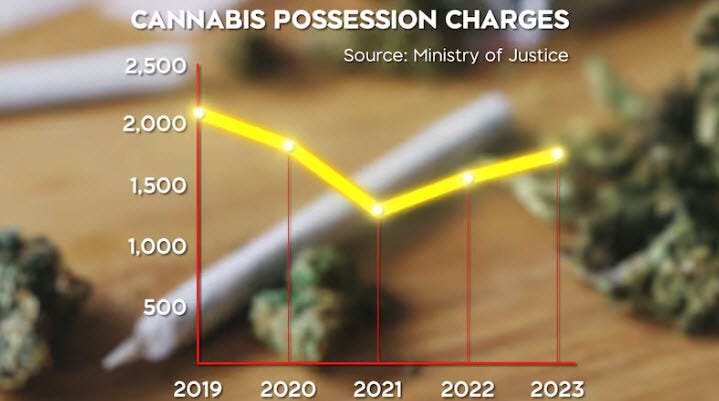
And from the graph, it appears that the police do believe that prosecution is in the public interest.
Labour police spokesperson Ginny Andersen said the increase in prosecution “doesn’t seem fair”.
11 Vietnamese nationals were arrested and deported by Immigration NZ following a recent bust where a total of 3385 cannabis plants and 48kg of dried buds were found in rented homes in Auckland. The drugs seized were worth around $18m. The argument was that it’s better and cheaper to boot them out of the country rather than put them in prison at cost to the taxpayer.
Sounds a good decision to me. But Benedict Collins can’t quite understand it.
Well at least the Green MP admits what the real agenda is eh
What 1News and Ginny Anderson and other drug activists never acknowledge is that all the research shows that most convictions are not for the drug use per se – but for drug related offences, that is, crimes committed while on drugs (murder, armed robbery, theft, assault, child abuse, etc.) or crimes committed in order to obtain drugs. Or for dealing drugs and putting our families and communities at risk.
If that line in the graph has to continue to go up to protect families, so be it.
But don’t expect the media or the drug activists to go quiet on this issue any time soon.
And neither will we.

